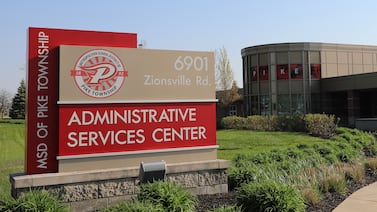During her reelection campaign, Gov. Gretchen Whitmer promised to prioritize teacher recruitment and retention, but the budget she will unveil on Wednesday includes just $100 million for it — a small fraction of what she proposed last year.
Her proposal last February called for spending $1.5 billion on teacher retention bonuses over four years. Republicans wouldn’t support that. This year, Whitmer’s own party is in charge of the Legislature, but the bonuses are no longer a budget priority.
Instead, Whitmer’s education agenda is focused on tutoring and preschool. During her State of the State address last month, Whitmer said she would work to provide free preschool for all 4-year-olds and to provide one-on-one tutoring for all students who need it.
How much she intends to invest in those initiatives will become clear Wednesday during a budget presentation to the House and Senate Appropriations Committees.
Those measures are part of the school aid budget that Whitmer will present along with a broader general fund budget proposal to invest in everything from agriculture to workforce development.
The governor’s office provided an early peek at her plan to continue the MI Future Educator incentive program, which was created in last year’s budget to help attract teachers. It provides $50 million in stipends for student teachers and $25 million in scholarships for education majors. Her new budget proposal would maintain those spending levels and add $25 million to “ensure sustainability of the program,” spokesman Bobby Leddy said.
“This is everything on recruitment and retention” in the budget, Leddy added in a text message Sunday. He did not provide details on how the additional money would be spent.
“In the best of years, education is a tough job, but the last few years have been historically challenging,” Whitmer said Sunday in a written statement. “Let’s build on our work last year to establish education fellowships, pay student teachers, boost teacher recruitment, and create more paths to the profession so every classroom has a caring, qualified educator.”
MI Future Educator provides up to $9,600 per semester for student teachers and up to $10,000 per year in tuition for Michigan residents who are enrolled in eligible educator preparation programs and working toward their first certification.
Education advocates including Launch Michigan, which first proposed the MI Future Educator program, are glad Whitmer wants it to continue.
“It clearly indicates that the governor recognizes that the solution to (the teacher shortage) is of a long-term nature,” said Adam Zemke, who was president of Launch Michigan when the program was conceived. “These are recruitment strategies that work.”
The Michigan Association of Secondary School Principals supports the initiatives, too.
“We have a massive educator shortage in the state of Michigan, and we need to address that shortage,” said spokesman Bob Kefgen. “Helping people become teachers will certainly help.”
Leddy did not respond to questions about why retention bonuses aren’t part of Whitmer’s new budget.
Others say that the moment for them may have passed. Last year at this time, COVID cases were spiking, and teachers were struggling to manage student behavior as students readjusted to in-person learning.
When Whitmer proposed the $1.5 billion in bonuses last year, “that felt like a one-time thing,” said Bob McCann, executive director of the K-12 Alliance of Michigan, which represents school administrators in six counties. “It’s not sustainable, to be honest.”
And, McCann said, bonuses aren’t the only way to support teachers.
“What we should be doing to keep teachers invested in staying in school starts with investing in classrooms,” he said. That means “putting more money into reading coaches, social workers, and things that help teachers to do their jobs and be successful in the classroom. That’s what’s critical in retaining teachers.”
The budget request comes as the state considers what to do with a projected $9 billion budget surplus. Whitmer and fellow Democrats want to use some of that to distribute inflation-relief checks to all taxpayers.
Tracie Mauriello covers state education policy for Chalkbeat Detroit and Bridge Michigan. Reach her at tmauriello@chalkbeat.org.








